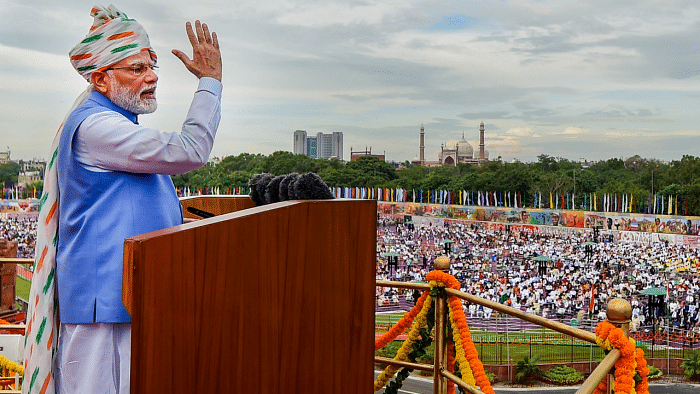
Prime Minister Narendra Modi’s address to the nation from the Red Fort, on the completion of 75 years of Independence, was long on ideas and short on details. In their Independence Day speeches, Prime Ministers have looked back on the performance of their governments in the past year and talked about the coming year. That has also been the day for the announcement of many a national scheme. Modi has also done that, and some flagship programmes of the government were first announced from the Red Fort. There was no such announcement of a specific programme on Monday, though the Prime Minister touched upon old programmes like the Swachhata Abhiyan. He rather took a longer view for the next 25 years and set the goal of turning the country into a “developed nation” by 2047. He spelt out five principles that should guide the country in its efforts to achieve this aim.
The five-point-plan, which Modi called “panch pran”, is not new and its elements have inspired the freedom struggle and have been part of national thinking since Independence. They are the goal of a developed India, removing all traces of colonial mindset, taking pride in the country’s traditions, leveraging the country’s unity, and respect by citizens for their duties. These principles are welcome as general principles, but when they are translated into political ideas and acted on in political contexts, they assume problematic meanings. The fight against colonial mindset and pride in the country’s traditions often manifests as xenophobia and glorification of many retrograde practices of the past. Unity is interpreted as uniformity and the absence of disagreement and criticism. The focus on duties can lead to the assertion that they are more important than fundamental rights.
The Prime Minister also said India should not wait for “certificates” from abroad and should develop its own “markers”. That is obviously a call to reject any international criticism of the government’s record on governance and human rights issues, a decline of democracy and other matters. The emphasis on rooting out corruption and nepotism is also fine but the government’s record in the matter has not been above board. It has targeted Opposition parties and leaders in the name of fighting corruption and shielded those who are on, or jump to, its side. The Prime Minister did well to talk about the need to empower women and to give them their rightful place, but an announcement that the government would get the women’s reservation bill passed would have made a lot of difference.
It is because of the problematic interpretations that the Prime Minister’s propositions are prone to that they cause concern. The government’s policies and actions based on these interpretations will make the journey to 2047 difficult.